初中英语动词时态和语态讲解(二)
(全面解读)初中英语动词时态和语态说明
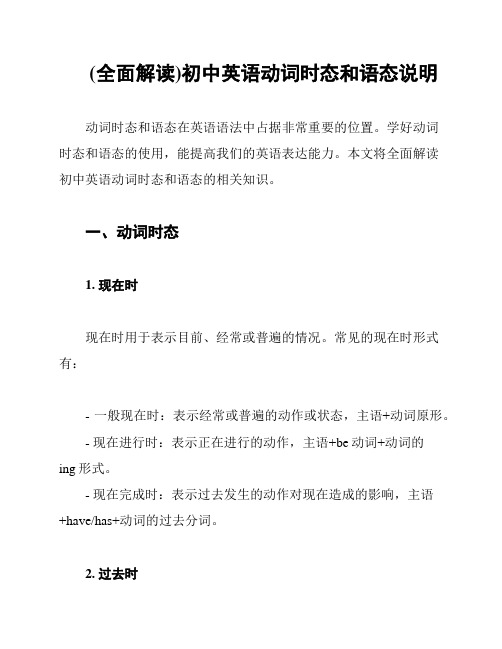
(全面解读)初中英语动词时态和语态说明动词时态和语态在英语语法中占据非常重要的位置。
学好动词时态和语态的使用,能提高我们的英语表达能力。
本文将全面解读初中英语动词时态和语态的相关知识。
一、动词时态1. 现在时现在时用于表示目前、经常或普遍的情况。
常见的现在时形式有:- 一般现在时:表示经常或普遍的动作或状态,主语+动词原形。
- 现在进行时:表示正在进行的动作,主语+be动词+动词的ing形式。
- 现在完成时:表示过去发生的动作对现在造成的影响,主语+have/has+动词的过去分词。
2. 过去时过去时用于表示过去发生或已经结束的动作或状态。
常见的过去时形式有:- 一般过去时:表示过去发生的动作或状态,主语+动词过去式。
- 过去进行时:表示过去某个时间正在进行的动作,主语+was/were+动词的ing形式。
- 过去完成时:表示在过去某个时间之前已经发生的动作,主语+had+动词的过去分词。
3. 将来时将来时用于表示将来发生的动作或状态。
常见的将来时形式有:- 一般将来时:表示将来某个时间发生的动作或状态,主语+will/shall+动词原形。
- 将来进行时:表示将来某个时间正在进行的动作,主语+will/shall be+动词的ing形式。
- 将来完成时:表示将来某个时间之前已经完成的动作,主语+will/shall have+动词的过去分词。
二、动词语态1. 主动语态主动语态表示主语是动作的执行者。
主动语态的形式为:主语+动词。
2. 被动语态被动语态表示主语是动作的承受者。
被动语态的形式为:主语+be动词+动词的过去分词。
被动语态的构成涉及到时态的变化。
常见的被动语态形式有:- 现在被动语态:主语+am/is/are+动词的过去分词。
- 过去被动语态:主语+was/were+动词的过去分词。
- 将来被动语态:主语+will/shall be+动词的过去分词。
被动语态的使用要根据上下文和需要进行判断。
初中英语知识归纳总结——动词的时态

初中英语知识归纳总结——动词的时态动词的时态(一)教学重点一般现在时在英语中,不同时间里以不同方式发生的动作或存在的状态,要用不同的动词形式来表示,动词的这种不同形式称为动词的时态。
时态从时间上划分,可分为四大类:现在时;过去时;将来时;过去将来时。
从行为上,每一类可以分为四种形式:一般式;进行式;完成式;完成进行式。
这样英语的动词合起来,总共有十六种时态,初中只需掌握其中的八种时态。
1、一般现在时(1)一般现在时表示现在的状态、习惯性的动作或主语所具备的性格和能力等。
①当动词是be时,第一人称用am,第二人称用is,其他人称用are.②当动词是实义动词时,一般用动词原形,但如果主语是第三人称单数时,动词必须用第三人称单数形式,其变化规则如下:助动词do(第三人称单数用does)构成否定句、疑问句及答语,但要注意助动词后原来的谓语动词要恢复原形。
例如:I like music.I don’t like music.Do you like music?Yes, I do No, I don’t(2)一般现在时的用法①表示经常、习惯性动作,常和often, usually, every day, sometimes, always 等时间状语连用。
如:He goes to school by bus every day.They often play football②表示能力、职业、特征。
如:Miss Gao teaches English.Do you speak Japanese?③表示客观存在。
如:The earth moves round the sun.Time and tide wait for no man.④表示已经安排好或计划好的事。
如The plane takes off at 7:30.Classes begin at 8:00⑤在时间状语和条件状语从句中,主句用一般将来时,从句用一般现在时。
初中英语知识点归纳动词的不同时态与语态

初中英语知识点归纳动词的不同时态与语态动词的不同时态与语态是初中英语的重要知识点。
掌握了动词的时态和语态,我们就能更准确地表达过去、现在和将来的动作,以及主语对动作的不同态度。
下面是对初中英语中动词的不同时态与语态的归纳总结。
一、动词的时态1. 一般现在时一般现在时表示经常性或习惯性的动作、客观真理、固定事件等。
例句:- I go to school every day.(我每天去上学。
)- The sun rises in the east.(太阳从东方升起。
)2. 现在进行时现在进行时表示现在正在进行的动作。
例句:- He is watching TV now.(他正在看电视。
)- They are playing basketball in the park.(他们正在公园里打篮球。
)3. 一般过去时一般过去时表示过去发生的动作或存在的状态。
例句:- We watched a movie last night.(昨晚我们看了一场电影。
)- She lived in Beijing when she was young.(她年轻时住在北京。
)4. 过去进行时过去进行时表示过去某个时间正在进行的动作。
例句:- They were having dinner at 7 o'clock yesterday.(昨天7点他们正在吃晚饭。
)- At this time last year, I was studying in London.(去年这个时间,我正在伦敦学习。
)5. 将来时将来时表示将要发生的动作或存在的状态。
例句:- We will go to the beach next week.(下周我们将去海滩。
)- She is going to visit her grandparents tomorrow.(她明天将要去看望她的祖父母。
)二、动词的语态1. 主动语态主动语态表示主语是动作的执行者。
最新初中英语语法知识—动词时态的知识点总复习含答案解析(2)
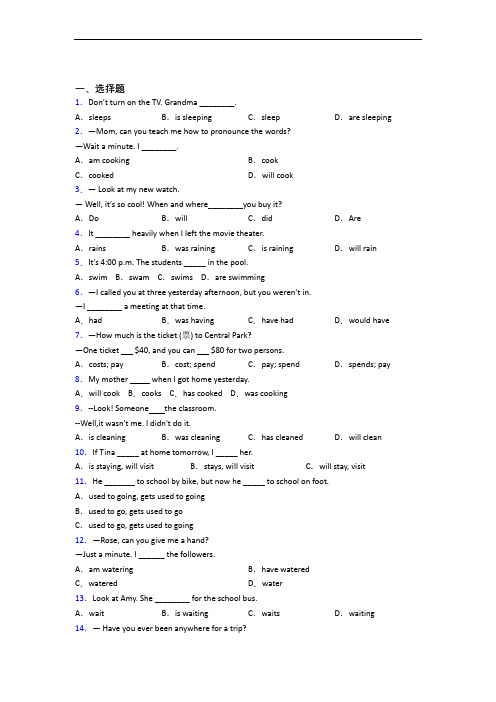
一、选择题1.Don’t turn on the TV. Grandma ________.A.sleeps B.is sleeping C.sleep D.are sleeping 2.—Mom, can you teach me how to pronounce the words?—Wait a minute. I ________.A.am cooking B.cookC.cooked D.will cook3.— Look at my new watch.—Well, it’s so cool! When and where________you buy it?A.Do B.will C.did D.Are4.It ________ heavily when I left the movie theater.A.rains B.was raining C.is raining D.will rain 5.It’s 4:00 p.m. The students _____ in the pool.A.swim B.swam C.swims D.are swimming6.—I called you at three yesterday afternoon, but you weren’t in.—I ________ a meeting at that time.A.had B.was having C.have had D.would have 7.—How much is the ticket (票) to Central Park?—One ticket $40, and you can $80 for two persons.A.costs; pay B.cost; spend C.pay; spend D.spends; pay 8.My mother when I got home yesterday.A.will cook B.cooks C.has cooked D.was cooking9.--Look! Someone the classroom.--Well,it wasn't me. I didn't do it.A.is cleaning B.was cleaning C.has cleaned D.will clean 10.If Tina _____ at home tomorrow, I _____ her.A.is staying, will visit B.stays, will visit C.will stay, visit 11.He _______ to school by bike, but now he _____ to school on foot.A.used to going, gets used to goingB.used to go, gets used to goC.used to go, gets used to going12.—Rose, can you give me a hand?—Just a minute. I ______ the followers.A.am watering B.have wateredC.watered D.water13.Look at Amy. She ________ for the school bus.A.wait B.is waiting C.waits D.waiting 14.— Have you ever been anywhere for a trip?— A trip? I ________ away from my hometown even once.A.went B.have gone C.have been D.have never been 15.The water ______ cool when I jumped into the pool for morning exercise.A.was felt B.is felt C.felt D.feels 16.While I_______ a detective story, someone_______ at the door.A.read, was knockingB.read, knockedC.was reading, knockedD.was reading, was knocking17.--What age did you leave home ?--I left home at 18. I ___your city for five yearsA.have gone to B.have been to C.have been in D.have come to 18.The film Operation Red Sea_____a lot of praise since its first show months ago. A.wins B.win C.will win D.has won 19.It’s 8 o’clock. The students _________ an English class.A.have B.having C.is having D.are having 20.—Did you hear the strange noise next door around 9 o’clock last night?— No, I ________my favourite film in my bedroom.A.watch B.watched C.am watching D.was watching 21.Don’t talk! The baby ________.A.sleeps B.is sleep C.sleeping D.is sleeping 22.— What do you use MP3 for?— I ________ it ________ to music.A.use; listen B.are listening; listeningC.use; to listen D.is listening; to listening23.My father was reading ________ I was sleeping.A.while B.when C.before D.after 24.Look! All my classmates ___________ on the playground.A.are running B.ran C.were running D.run25.—I can’t find Peter. Where is he?— He ______ tea in the living room.A.drinks B.drinking C.is drinking D.drink【参考答案】***试卷处理标记,请不要删除一、选择题1.B【解析】【分析】【详解】句意:别开电视,奶奶正在睡觉。
初中动词的时态与语态
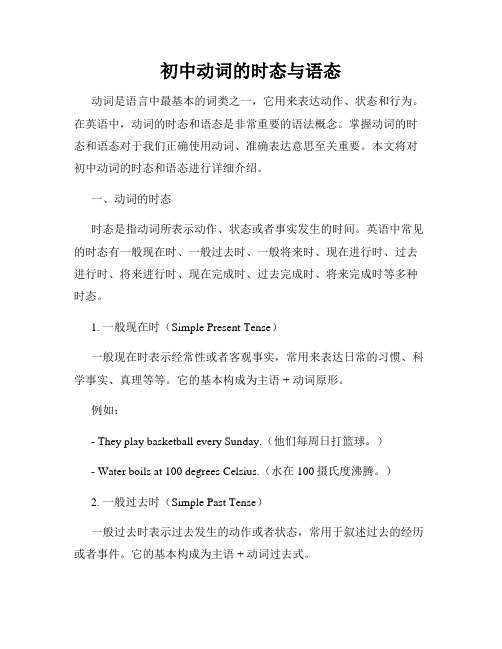
初中动词的时态与语态动词是语言中最基本的词类之一,它用来表达动作、状态和行为。
在英语中,动词的时态和语态是非常重要的语法概念。
掌握动词的时态和语态对于我们正确使用动词、准确表达意思至关重要。
本文将对初中动词的时态和语态进行详细介绍。
一、动词的时态时态是指动词所表示动作、状态或者事实发生的时间。
英语中常见的时态有一般现在时、一般过去时、一般将来时、现在进行时、过去进行时、将来进行时、现在完成时、过去完成时、将来完成时等多种时态。
1. 一般现在时(Simple Present Tense)一般现在时表示经常性或者客观事实,常用来表达日常的习惯、科学事实、真理等等。
它的基本构成为主语 + 动词原形。
例如:- They play basketball every Sunday.(他们每周日打篮球。
)- Water boils at 100 degrees Celsius.(水在100摄氏度沸腾。
)2. 一般过去时(Simple Past Tense)一般过去时表示过去发生的动作或者状态,常用于叙述过去的经历或者事件。
它的基本构成为主语 + 动词过去式。
例如:- I visited my grandparents last weekend.(我上个周末去看望了我的祖父母。
)- She didn't go to school yesterday.(她昨天没有去上学。
)3. 一般将来时(Simple Future Tense)一般将来时表示将来要发生的动作或者状态,常用于表达计划、打算、预测等等。
它的基本构成为主语 + will + 动词原形。
例如:- We will have a party next Friday.(我们下周五要举办一个聚会。
)- She won't come to the meeting tomorrow.(她明天不会来参加会议。
)4. 现在进行时(Present Continuous Tense)现在进行时表示正在进行的动作,通常用于描述当前正在发生的事情。
初中英语动词的时态和语态!必考知识点!
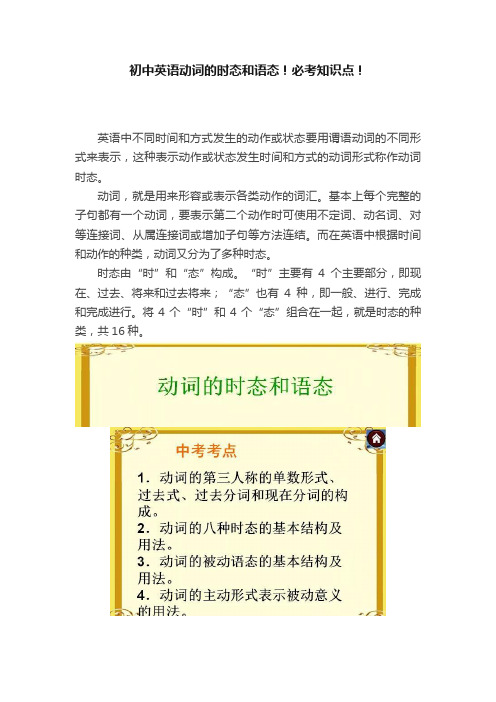
初中英语动词的时态和语态!必考知识点!
英语中不同时间和方式发生的动作或状态要用谓语动词的不同形式来表示,这种表示动作或状态发生时间和方式的动词形式称作动词时态。
动词,就是用来形容或表示各类动作的词汇。
基本上每个完整的子句都有一个动词,要表示第二个动作时可使用不定词、动名词、对等连接词、从属连接词或增加子句等方法连结。
而在英语中根据时间和动作的种类,动词又分为了多种时态。
时态由“时”和“态”构成。
“时”主要有4个主要部分,即现在、过去、将来和过去将来;“态”也有4种,即一般、进行、完成和完成进行。
将4个“时”和4个“态”组合在一起,就是时态的种类,共16种。
2023年安徽省中考英语总复习一轮复习:第2讲-动词的时态和语态 (二)-教案
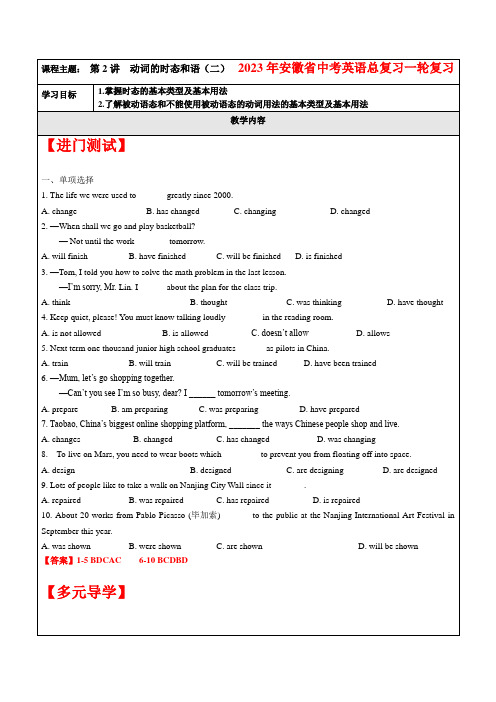
A. design
B. designed
C. are designing
D. are designed
9. Lots of people like to take a walk on Nanjing City Wall since it _______.
A. repaired
B. was repaired
-- He has gone to the supermarket. (3)have/ has been in:待在某地,住在某地。 例:I have been in Nanjing for three years.
2. for 和 since 的区别 (1)since 的用法 A. since 后可加时间点,如:It has been nine years since 1987. B. since 引导时间状语从句时,后面的时间状语从句动词用一般过去时,主句动词用现在完成时 (2) for 的用法:for 后加一段时间。如:They have worked in the factory for ten months . (3)since 和 for 用法的相互转换:for +一段时间= since+ 一段时间+ ago (4)对 since 和 for 的提问用 how long。如: —How long have you been in Nanjing?
1.表示经常性或习惯性发生的动作; 2.描述客观真理、客观存在或科学事实等; 3.在时间、条件状语从句中,用一般现在时表将
来。
be 动词的一般过去时 was/were+表语
1.表示过去存在的状态; 2.表示过去经常存在的状态。
行为动词及其他连系动
词的一般过去时
英语时态与语态语法讲解
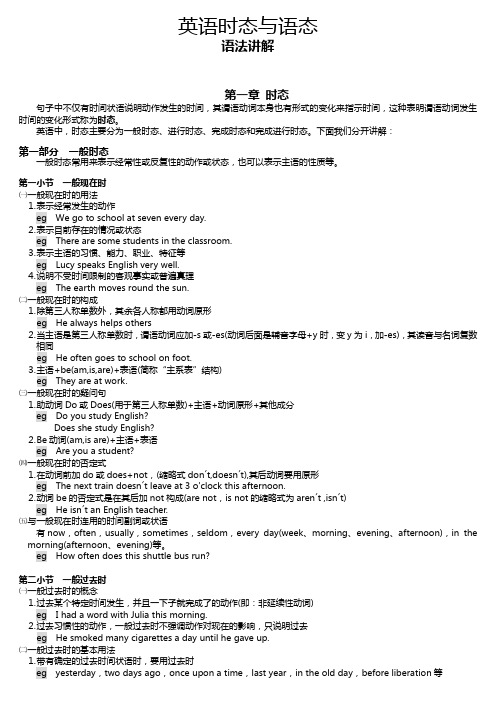
英语时态与语态语法讲解第一章时态句子中不仅有时间状语说明动作发生的时间,其谓语动词本身也有形式的变化来指示时间,这种表明谓语动词发生时间的变化形式称为时态。
英语中,时态主要分为一般时态、进行时态、完成时态和完成进行时态。
下面我们分开讲解:第一部分一般时态一般时态常用来表示经常性或反复性的动作或状态,也可以表示主语的性质等。
第一小节一般现在时㈠一般现在时的用法⒈表示经常发生的动作eg We go to school at seven every day.⒉表示目前存在的情况或状态eg There are some students in the classroom.⒊表示主语的习惯、能力、职业、特征等eg Lucy speaks English very well.⒋说明不受时间限制的客观事实或普遍真理eg The earth moves round the sun.㈡一般现在时的构成⒈除第三人称单数外,其余各人称都用动词原形eg He always helps others⒉当主语是第三人称单数时,谓语动词应加-s或-es(动词后面是辅音字母+y时,变y为i,加-es),其读音与名词复数相同eg He often goes to school on foot.⒊主语+be(am,is,are)+表语(简称“主系表”结构)eg They are at work.㈢一般现在时的疑问句⒈助动词Do或Does(用于第三人称单数)+主语+动词原形+其他成分eg Do you study English?Does she study English?⒉Be动词(am,is are)+主语+表语eg Are you a student?㈣一般现在时的否定式⒈在动词前加do或does+not,(缩略式don´t,doesn´t),其后动词要用原形eg The next train doesn´t leave at 3 o'clock this afternoon.⒉动词be的否定式是在其后加not构成(are not,is not的缩略式为aren´t ,isn´t)eg He isn´t an English teacher.㈤与一般现在时连用的时间副词或状语有now,often,usually,sometimes,seldom,every day(week、morning、evening、afternoon),in the morning(afternoon、evening)等。
(完整版)初中英语动词时态和语态讲解
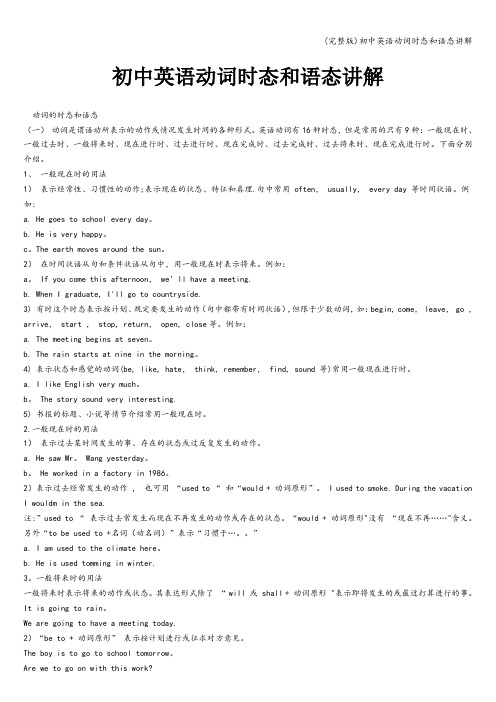
初中英语动词时态和语态讲解动词的时态和语态(一)动词是谓语动所表示的动作或情况发生时间的各种形式。
英语动词有16种时态,但是常用的只有9种:一般现在时、一般过去时、一般将来时、现在进行时、过去进行时、现在完成时、过去完成时、过去将来时、现在完成进行时。
下面分别介绍。
1、一般现在时的用法1)表示经常性、习惯性的动作;表示现在的状态、特征和真理.句中常用 often, usually, every day 等时间状语。
例如:a. He goes to school every day。
b. He is very happy。
c。
The earth moves around the sun。
2)在时间状语从句和条件状语从句中,用一般现在时表示将来。
例如:a。
If you come this afternoon,we’ll have a meeting.b. When I graduate, I'll go to countryside.3) 有时这个时态表示按计划、规定要发生的动作(句中都带有时间状语),但限于少数动词,如:begin, come, leave, go ,arrive, start , stop, return, open, close等。
例如:a. The meeting begins at seven。
b. The rain starts at nine in the morning。
4) 表示状态和感觉的动词(be, like, hate, think, remember, find, sound 等)常用一般现在进行时。
a. I like English very much。
b。
The story sound very interesting.5) 书报的标题、小说等情节介绍常用一般现在时。
2.一般现在时的用法1)表示过去某时间发生的事、存在的状态或过反复发生的动作。
(全面解读)初中英语动词时态和语态说明
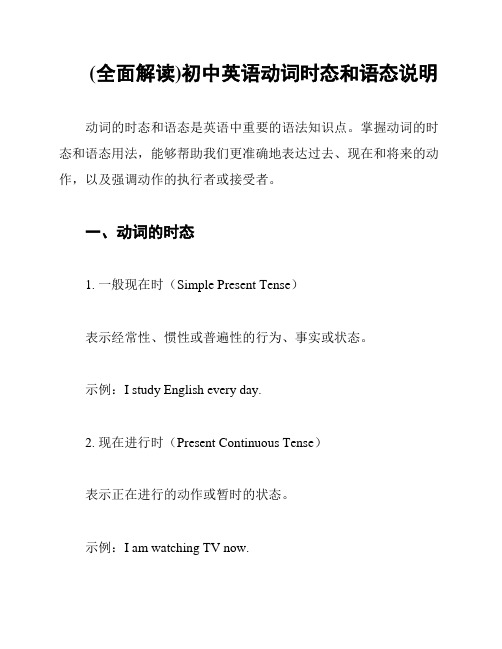
(全面解读)初中英语动词时态和语态说明动词的时态和语态是英语中重要的语法知识点。
掌握动词的时态和语态用法,能够帮助我们更准确地表达过去、现在和将来的动作,以及强调动作的执行者或接受者。
一、动词的时态1. 一般现在时(Simple Present Tense)表示经常性、惯性或普遍性的行为、事实或状态。
示例:I study English every day.2. 现在进行时(Present Continuous Tense)表示正在进行的动作或暂时的状态。
示例:I am watching TV now.3. 一般过去时(Simple Past Tense)表示过去发生的动作或存在的状态。
示例:She played basketball yesterday.4. 过去进行时(Past Continuous Tense)表示过去某个时间段内正在进行的动作。
示例:They were studying English last night.5. 现在完成时(Present Perfect Tense)表示过去某个时间内发生的动作对现在的影响或结果。
示例:He has finished his homework.6. 过去完成时(Past Perfect Tense)表示过去某个时间点或动作之前已经完成的动作。
示例:She had already left when I arrived.7. 将来时(Future Tense)表示将要发生的动作或存在的状态。
示例:We will go to the beach next week.二、动词的语态1. 被动语态(Passive Voice)动作的执行者是不确定的、不重要的,强调动作的承受者。
示例:The cake was eaten by him.2. 主动语态(Active Voice)动作的执行者是明确的、重要的。
示例:She wrote a letter.以上是初中英语动词时态和语态的简单说明。
动词详解3

评了。 A bridge should be built here. 这儿应该建座桥。
现在时
过去时
将来时
语态
主动语态
一般时
完成时
进行时
被动语态
以I clean the house为例
I clean the house.
I cleaned the house yesterday.
一般现在时(第三人称单数加 s)
一般过去时(v-ed,见表格)
I will clean the house
将来完成时(will have done)
过去将来时(would do/ was/were going to do)
过去将来完成时(would have done, “本想做但并 未做” )
以I clean the house为例
I have been cleaning the house for 3 hours.
house at this time
tomorrow.
将来进行时(will be doing)
以I clean the house为例
I have cleaned the house for 3 hours.
I had cleaned the house before I cooked.
I will have cleaned the house by 10 tonight.
tomorrow.
一般将来时(will/be going to
I am cleaning the house. do)
I was cleaning the house at this time yesterday. 现在进行时(be doing)
(完备版)初中英语动词时态和语态解读
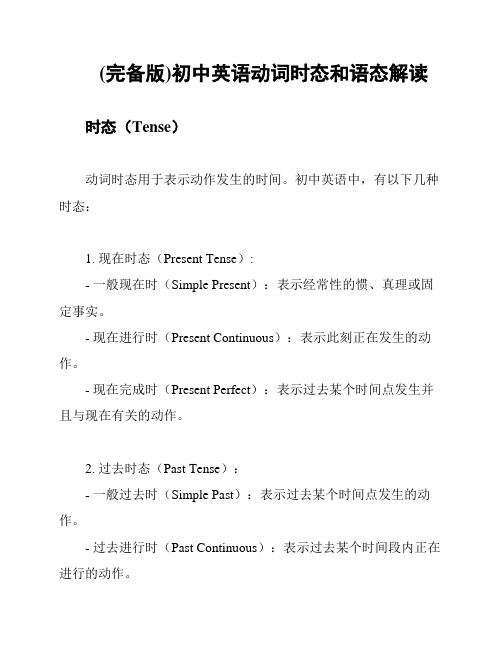
(完备版)初中英语动词时态和语态解读时态(Tense)动词时态用于表示动作发生的时间。
初中英语中,有以下几种时态:1. 现在时态(Present Tense):- 一般现在时(Simple Present):表示经常性的惯、真理或固定事实。
- 现在进行时(Present Continuous):表示此刻正在发生的动作。
- 现在完成时(Present Perfect):表示过去某个时间点发生并且与现在有关的动作。
2. 过去时态(Past Tense):- 一般过去时(Simple Past):表示过去某个时间点发生的动作。
- 过去进行时(Past Continuous):表示过去某个时间段内正在进行的动作。
- 过去完成时(Past Perfect):表示过去某个时间点之前已经完成的动作。
3. 将来时态(Future Tense):- 一般将来时(Simple Future):表示将来会发生的动作。
- 将来进行时(Future Continuous):表示将来某个时间段内正在进行的动作。
- 将来完成时(Future Perfect):表示将来某个时间点之前已经完成的动作。
语态(Voice)语态用于表示句子的主语是动作的执行者还是承受者。
初中英语中主要有以下两种语态:1. 主动语态(Active Voice):主语是动作的执行者,强调动作的主动性。
2. 被动语态(Passive Voice):主语是动作的承受者,强调动作的受事性。
时态和语态的变化在不同的时态和语态下,动词的形式会有所变化。
以下是一些常见时态和语态的变化规律:- 一般现在时的变化:- 主动语态:动词原形,例如:I eat an apple.- 被动语态:be动词(am/is/are) + 动词的过去分词,例如:An apple is eaten by me.- 一般过去时的变化:- 主动语态:动词过去式,例如:I ate an apple.- 被动语态:be动词的过去式(was/were)+ 动词的过去分词,例如:An apple was eaten by me.- 一般将来时的变化:- 主动语态:will + 动词原形,例如:I will eat an apple.- 被动语态:will + be动词(am/is/are) + 动词的过去分词,例如:An apple will be eaten by me.以上仅为部分时态和语态的变化规律,根据实际需要和句子结构,动词的形式有可能会有更多的变化。
(全面版)初中英语动词时态和语态解析
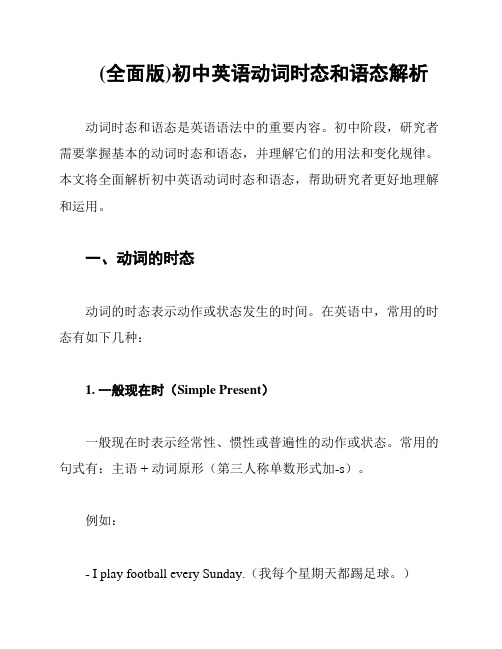
(全面版)初中英语动词时态和语态解析动词时态和语态是英语语法中的重要内容。
初中阶段,研究者需要掌握基本的动词时态和语态,并理解它们的用法和变化规律。
本文将全面解析初中英语动词时态和语态,帮助研究者更好地理解和运用。
一、动词的时态动词的时态表示动作或状态发生的时间。
在英语中,常用的时态有如下几种:1. 一般现在时(Simple Present)一般现在时表示经常性、惯性或普遍性的动作或状态。
常用的句式有:主语 + 动词原形(第三人称单数形式加-s)。
例如:- I play football every Sunday.(我每个星期天都踢足球。
)- She watches TV every evening.(她每天晚上都看电视。
)2. 一般过去时(Simple Past)一般过去时表示过去某个时间发生的动作或状态。
常用的句式有:主语 + 动词过去式。
例如:- I traveled to Beijing last summer.(我去年夏天去了北京。
)- They studied hard for the exam.(他们为考试努力研究。
)3. 一般将来时(Simple Future)一般将来时表示将来某个时间将要发生的动作或状态。
常用的句式有:主语 + will + 动词原形。
例如:- He will visit his grandparents next week.(他下周会去拜访他的祖父母。
)- We will have a party on Saturday.(我们周六会举办一次聚会。
)4. 现在进行时(Present Continuous)现在进行时表示现在正在进行的动作。
常用的句式有:主语 + am/is/are + 动词-ing 形式。
例如:- She is studying in the library now.(她现在在图书馆里研究。
)- They are playing basketball in the park.(他们正在公园里打篮球。
(全面解析)初中英语动词时态和语态说明
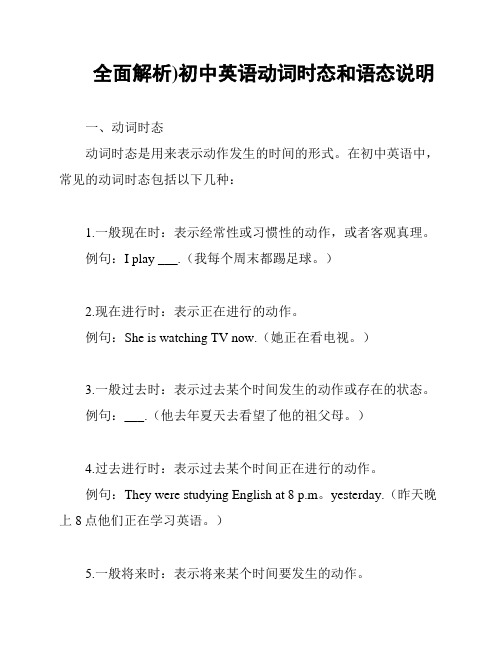
全面解析)初中英语动词时态和语态说明一、动词时态动词时态是用来表示动作发生的时间的形式。
在初中英语中,常见的动词时态包括以下几种:1.一般现在时:表示经常性或习惯性的动作,或者客观真理。
例句:I play ___.(我每个周末都踢足球。
)2.现在进行时:表示正在进行的动作。
例句:She is watching TV now.(她正在看电视。
)3.一般过去时:表示过去某个时间发生的动作或存在的状态。
例句:___.(他去年夏天去看望了他的祖父母。
)4.过去进行时:表示过去某个时间正在进行的动作。
例句:They were studying English at 8 p.m。
yesterday.(昨天晚上8点他们正在学习英语。
)5.一般将来时:表示将来某个时间要发生的动作。
例句:We will have a party next weekend.(下个周末我们将举行一次派对。
)6.将来进行时:表示将来某个时间正在进行的动作。
例句:They will be ___ basketball at 5 ___.(明天下午5点他们将在打篮球。
)二、动词语态动词语态是用来表示句子的主语和谓语动词之间的关系的形式。
在初中英语中,常见的动词语态包括以下几种:1.主动语态:表示主语是动作的执行者。
例句:___.(她写一封信。
)2.被动语态:表示主语是动作的承受者。
例句:___ is written by her.(这封信是她写的。
)三、时态和语态的变化在英语中,时态和语态会因时态和语态的变化而发生变化。
变化形式如下:1.时态变化:现在式:am/is/are → was/were过去式:was/were → am/is/are将来式:will → would现在分词:ing → 随时间变化过去分词:过去式 + 动词的过去分词形式2.语态变化:主动语态:动词原形→ 无被动语态:is/are/am + 过去分词→ was/were + 过去分词以上就是初中英语动词时态和语态的全面解析。
英语动词时态、语态典型错误例析2011.7.22[五篇]
![英语动词时态、语态典型错误例析2011.7.22[五篇]](https://img.taocdn.com/s3/m/a968143d773231126edb6f1aff00bed5b9f3738a.png)
英语动词时态、语态典型错误例析2011.7.22[五篇]第一篇:英语动词时态、语态典型错误例析2011.7.22英语动词时态、语态典型错误例析在初中英语学习阶段,动词的时态和语态是非常重要的语法项目,并且也是经常出现问题的关键所在,现将使用英语动词的时态和语态这两个语法项目过程中经常出现的典型错误列举如下:1.对不起,我没看见张先生在这儿。
[误] Sorry, I don't see Mr Zhang here.[正] Sorry, I didn't see Mr Zhang here.[析] 根据语境,本句是指刚才没看见对方在这,而不是现在没看见对方在这,所以要用一般过去时。
2.你能告诉我北京冬天是否下雪吗?[误] Could you tell me if it snowed in winter in Beijing?[正] Could you tell me if it snows in winter in Beijing?[析] 一般现在时除表示经常性的动作外,还可表示习惯性的动作,即现阶段的一个事实,句中不需要任何经常性的时间状语配合。
could 表示一种客气的语气,不表示过去时态。
3.他说他第二天要去合肥出差。
[误] He said he will go to Hefei on business the next day.[正] He said he would go to Hefei on business the next day.[析] 主句谓语动词为过去时,宾语从句表示过去的将来要发生的动作,要用过去将来时。
4.我忘了把你的伞带来了。
[误] I forget to bring your umbrella with me.[正] I forgot to bring your umbrella with me.[析] 不用forget,而用forgot,因为现在已经记起来了,forgot是说话这一时刻之前的动作。
(详细版)初中英语动词时态和语态讲解
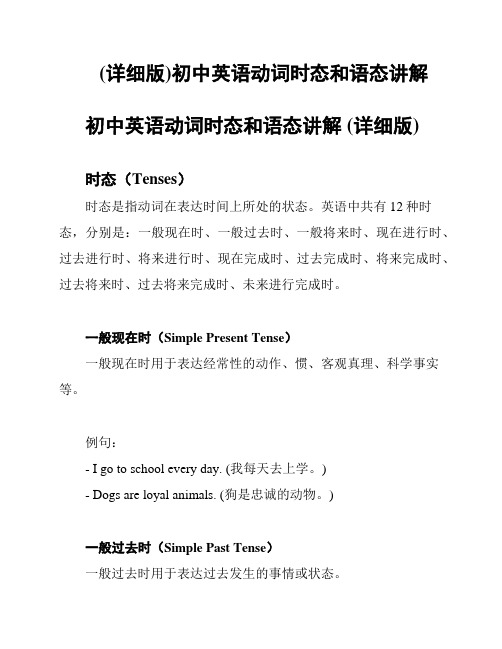
(详细版)初中英语动词时态和语态讲解初中英语动词时态和语态讲解 (详细版)时态(Tenses)时态是指动词在表达时间上所处的状态。
英语中共有12种时态,分别是:一般现在时、一般过去时、一般将来时、现在进行时、过去进行时、将来进行时、现在完成时、过去完成时、将来完成时、过去将来时、过去将来完成时、未来进行完成时。
一般现在时(Simple Present Tense)一般现在时用于表达经常性的动作、惯、客观真理、科学事实等。
例句:- I go to school every day. (我每天去上学。
)- Dogs are loyal animals. (狗是忠诚的动物。
)一般过去时(Simple Past Tense)一般过去时用于表达过去发生的事情或状态。
例句:- We visited Paris last summer. (去年夏天我们参观了巴黎。
)- She lived in Japan for two years. (她在日本住了两年。
)一般将来时(Simple Future Tense)一般将来时用于表达将来将要发生的事情或状态。
例句:- I will call you tomorrow. (我明天会打电话给你。
)- They are going to travel to Europe next month. (他们下个月要去欧洲旅行。
)现在进行时(Present Continuous Tense)现在进行时用于表达正在进行的动作。
例句:- She is studying for her exams. (她正在为考试而研究。
)- They are playing soccer in the park. (他们正在公园里踢足球。
)过去进行时(Past Continuous Tense)过去进行时用于表达过去某个时间正在进行的动作。
例句:- We were watching a movie when the power went out. (停电时我们正在看电影。
初中英语动词八大时态详解
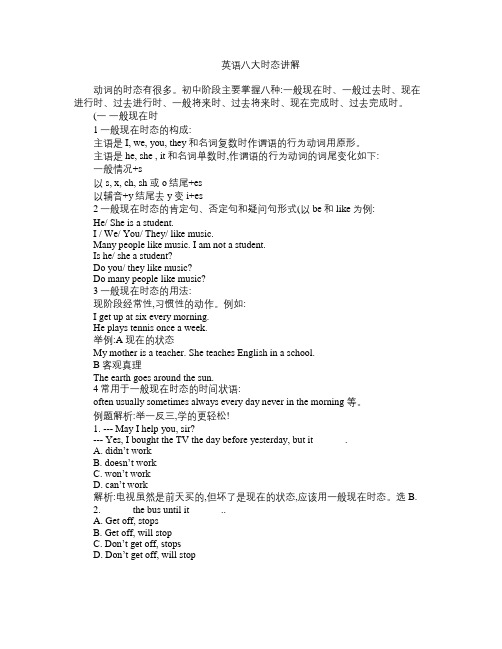
英语八大时态讲解动词的时态有很多。
初中阶段主要掌握八种:一般现在时、一般过去时、现在进行时、过去进行时、一般将来时、过去将来时、现在完成时、过去完成时。
(一一般现在时1一般现在时态的构成:主语是I, we, you, they和名词复数时作谓语的行为动词用原形。
主语是he, she , it和名词单数时,作谓语的行为动词的词尾变化如下:一般情况+s以s, x, ch, sh 或o结尾+es以辅音+y结尾去y变i+es2一般现在时态的肯定句、否定句和疑问句形式(以be和like为例:He/ She is a student.I / We/ You/ They/ like music.Many people like music. I am not a student.Is he/ she a student?Do you/ they like music?Do many people like music?3一般现在时态的用法:现阶段经常性,习惯性的动作。
例如:I get up at six every morning.He plays tennis once a week.举例:A 现在的状态My mother is a teacher. She teaches English in a school.B 客观真理The earth goes around the sun.4常用于一般现在时态的时间状语:often usually sometimes always every day never in the morning 等。
例题解析:举一反三,学的更轻松!1. --- May I help you, sir?--- Yes, I bought the TV the day before yesterday, but it ______.A. didn’t workB. doesn’t workC. won’t workD. can’t work解析:电视虽然是前天买的,但坏了是现在的状态,应该用一般现在时态。
中学重要知识点总结动词时态与语态详解
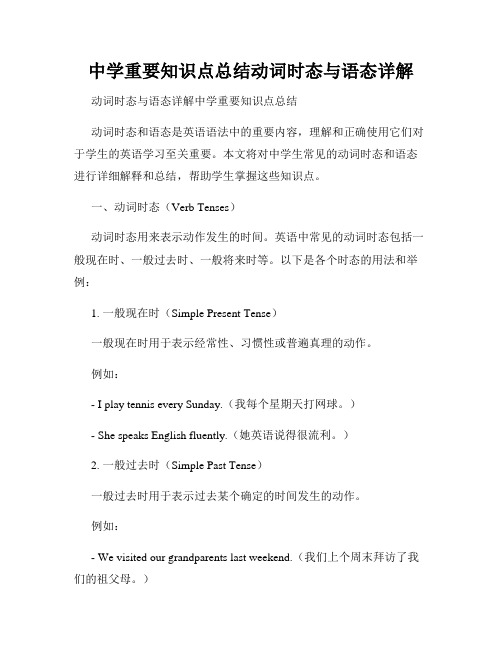
中学重要知识点总结动词时态与语态详解动词时态与语态详解中学重要知识点总结动词时态和语态是英语语法中的重要内容,理解和正确使用它们对于学生的英语学习至关重要。
本文将对中学生常见的动词时态和语态进行详细解释和总结,帮助学生掌握这些知识点。
一、动词时态(Verb Tenses)动词时态用来表示动作发生的时间。
英语中常见的动词时态包括一般现在时、一般过去时、一般将来时等。
以下是各个时态的用法和举例:1. 一般现在时(Simple Present Tense)一般现在时用于表示经常性、习惯性或普遍真理的动作。
例如:- I play tennis every Sunday.(我每个星期天打网球。
)- She speaks English fluently.(她英语说得很流利。
)2. 一般过去时(Simple Past Tense)一般过去时用于表示过去某个确定的时间发生的动作。
例如:- We visited our grandparents last weekend.(我们上个周末拜访了我们的祖父母。
)- He played basketball when he was young.(他年轻时打篮球。
)3. 一般将来时(Simple Future Tense)一般将来时用于表示将来某个时间将要发生的动作。
例如:- They will go to the park tomorrow.(他们明天将去公园。
)- I am sure she will pass the exam.(我相信她会通过考试。
)4. 现在进行时(Present Continuous Tense)现在进行时用于表示现在正在进行的动作。
例如:- She is studying in the library now.(她现在正在图书馆学习。
)- They are playing football on the field.(他们正在场上踢足球。
)5. 过去进行时(Past Continuous Tense)过去进行时用于表示过去某个时间段内正在进行的动作。
初中重要知识点归纳动词时态与语态的用法总结
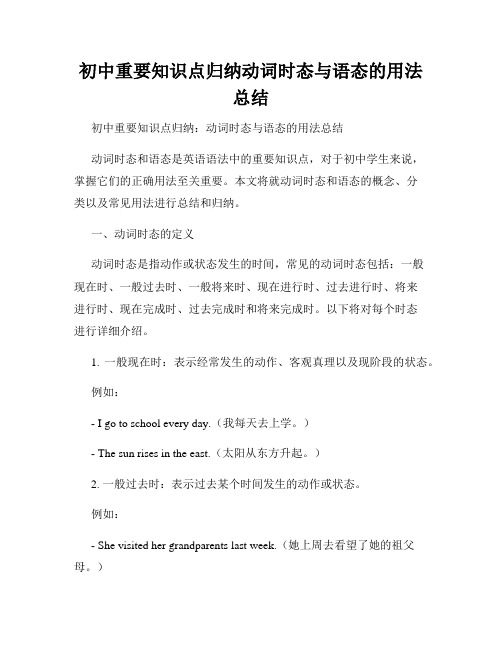
初中重要知识点归纳动词时态与语态的用法总结初中重要知识点归纳:动词时态与语态的用法总结动词时态和语态是英语语法中的重要知识点,对于初中学生来说,掌握它们的正确用法至关重要。
本文将就动词时态和语态的概念、分类以及常见用法进行总结和归纳。
一、动词时态的定义动词时态是指动作或状态发生的时间,常见的动词时态包括:一般现在时、一般过去时、一般将来时、现在进行时、过去进行时、将来进行时、现在完成时、过去完成时和将来完成时。
以下将对每个时态进行详细介绍。
1. 一般现在时:表示经常发生的动作、客观真理以及现阶段的状态。
例如:- I go to school every day.(我每天去上学。
)- The sun rises in the east.(太阳从东方升起。
)2. 一般过去时:表示过去某个时间发生的动作或状态。
例如:- She visited her grandparents last week.(她上周去看望了她的祖父母。
)- They lived in that house for five years.(他们在那个房子里住了五年。
)3. 一般将来时:表示将来某个时间将要发生的动作或状态。
例如:- We will have a party next weekend.(我们下个周末将要举办一次派对。
)- He is leaving for London tomorrow.(他明天将离开去伦敦。
)4. 现在进行时:表示现在正在进行的动作。
例如:- I am reading a book.(我正在读一本书。
)- They are playing basketball in the park.(他们正在公园里打篮球。
)5. 过去进行时:表示过去某个时间正在进行的动作。
例如:- She was studying when I called her.(我给她打电话的时候,她正在学习。
)- We were watching a movie at that time.(那个时候我们正在看电影。
(详细解析)初中英语动词时态和语态讲解
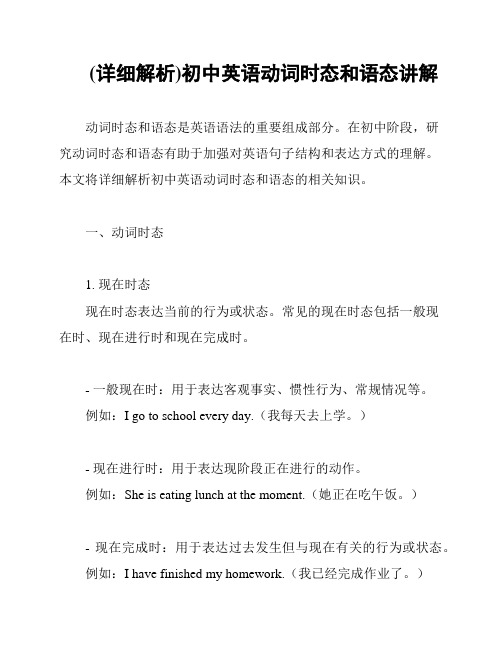
(详细解析)初中英语动词时态和语态讲解动词时态和语态是英语语法的重要组成部分。
在初中阶段,研究动词时态和语态有助于加强对英语句子结构和表达方式的理解。
本文将详细解析初中英语动词时态和语态的相关知识。
一、动词时态1. 现在时态现在时态表达当前的行为或状态。
常见的现在时态包括一般现在时、现在进行时和现在完成时。
- 一般现在时:用于表达客观事实、惯性行为、常规情况等。
例如:I go to school every day.(我每天去上学。
)- 现在进行时:用于表达现阶段正在进行的动作。
例如:She is eating lunch at the moment.(她正在吃午饭。
)- 现在完成时:用于表达过去发生但与现在有关的行为或状态。
例如:I have finished my homework.(我已经完成作业了。
)2. 过去时态过去时态用于表达已经发生的动作或状态。
常见的过去时态包括一般过去时、过去进行时和过去完成时。
- 一般过去时:用于表达过去某个时间发生的动作。
例如:He visited his grandparents last weekend.(他上周末去看望了他的祖父母。
)- 过去进行时:用于表达过去某个时间正在进行的动作。
例如:They were playing soccer when it started raining.(当下雨开始时,他们正在踢足球。
)- 过去完成时:用于表达过去发生并完成的行为或状态。
例如:She had already left when I arrived.(当我到达时,她已经离开了。
)3. 将来时态将来时态用于表达将来发生的动作或状态。
常见的将来时态包括一般将来时、将来进行时和将来完成时。
- 一般将来时:用于表达将来某个时间要发生的动作。
例如:I will go to the cinema tomorrow.(我明天要去电影院。
)- 将来进行时:用于表达将来某个时间正在进行的动作。
- 1、下载文档前请自行甄别文档内容的完整性,平台不提供额外的编辑、内容补充、找答案等附加服务。
- 2、"仅部分预览"的文档,不可在线预览部分如存在完整性等问题,可反馈申请退款(可完整预览的文档不适用该条件!)。
- 3、如文档侵犯您的权益,请联系客服反馈,我们会尽快为您处理(人工客服工作时间:9:00-18:30)。
初中英语动词时态和语态讲解(二)4. 一般现在时表将来1)下列动词come, go, arrive, leave, start, begin, return的一般现在时可以表示将来,主要用来表示在时间上已确定或安排好的事情。
例如:a.The train leaves at six tomorrow morning. 火车明天上午六点开。
b.When does the bus star? It stars in ten minutes. 汽车什么时候开?十分钟后。
2)以here, there等开始的倒装句,表示动作正在进行。
例如:a.Here comes the bus. = The bus is coming. 车来了。
b.There goes the bell. = The bell is ringing. 铃响了。
3)在时间或条件句中。
例如:a.When Bill comes (不是will come), ask him to wait for me. 比尔来后,让他等我。
b.I'll write to you as soon as I arrive there. 我到了那里,就写信给你。
4)在动词hope, take care that, make sure that等的宾语从句中。
例如:a.I hope they have a nice time next week. 我希望他们下星期玩得开心。
b.Make sure that the windows are closed before you leave the room. 离开房间前,务必把窗户关了。
5. 用现在进行时表示将来下列动词come, go, arrive, leave, start, begin, return等现在进行时可以表示将来。
例如:a.I'm leaving tomorrow. 明天我要走了。
b.Are you staying here till next week? 你会在这儿呆到下周吗?6. 现在完成时现在完成时用来表示之前已发生或完成的动作或状态,其结果的影响现在还存在;也可表示持续到现在的动作或状态。
其构成:have(has)+过去分词。
重点:比较一般过去时与现在完成时1)一般过去时表示过去某时发生的动作或单纯叙述过去的事情,强调动作;现在完成时为过去发生的,强调过去的事情对现在的影响,强调的是影响。
2)一般过去时常与具体的时间状语连用,而现在完成时通常与模糊的时间状语连用,或无时间状语。
一般过去时的时间状语:yesterday, last week,…ago, in1980, in October, justnow等,皆为具体的时间状语。
现在完成时的时间状语:for, since, so far, ever, never, just, yet, till/until, up to now, in past years, always等,皆不确定的时间状语。
共同的时间状语:this morning, tonight, this April, now, already, recently, lately 等。
3)现在完成时可表示持续到现在的动作或状态,动词一般是延续性的,如live, teach, learn, work, study, know.。
一般过去时常用的非持续性动词有come, go, leave, start, die, finish, become, get married等。
例如:a.I saw this film yesterday. (强调看的动作发生过了)b.I have seen this film. (强调对现在的影响,电影的内容已经知道了)c.Why did you get up so early? (强调起床的动作已发生过了)d.Who hasn't handed in his paper? (强调有卷子未交,疑为不公平竞争)e.He has been in the League for three years. (在团内的状态可延续)f.He has been a League member for three years. (是团员的状态可持续)句子中如有过去时的时间副词(如yesterday, last, week, in 1960)时,不能使用现在完成时,要用过去时。
(错)Tom has written a letter to his parents last night.(对)Tom wrote a letter to his parents last night.用于现在完成时的句型1)It is the first / seco nd time.... that…结构中的从句部分,用现在完成时。
例如:It is the first time that I have visited the city. 这是我第一次访问这城市。
This is the first time (that)I've heard him sing. 这是我第一次听他唱歌。
注意:It was the third time that the boy had been late.2)This is +形容词最高级+that…结构,that 从句要用现在完成时。
例如:This is the best film that I've (ever)seen. 这是我看过的最好的电影。
典型例题(1)---Do you know our town at all? ---No, this is the first time I ___ here.A. wasB. have beenC. cameD. am coming答案B. This is the first time 后面所加从句应为现在完成时,故选B。
(2)---Have you ____ been to our town before? ---No, it's the first time I ___ here.A. even, comeB. even, have comeC. ever, comeD. ever, have come答案D. ever意为曾经或无论何时,反意词为never,此两词常用于完成时。
注意:非延续性动词的否定形式可以与表示延续时间的状语连用。
即动作不发生的状态是可以持续的。
(错)I have received his letter for a month.(对)I haven't received his letter for almost a month.重点:比较since和forSince 用来说明动作起始时间,for用来说明动作延续时间长度。
例如:I have lived here for more than twenty years.我住在这儿二十多年了。
I have lived here since I was born. 我从出生起就住在这儿了。
注意:并非有for 作为时间状语的句子都用现在完成时。
I worked here for more than twenty years. (我现在已不在这里工作。
)I have worked here for many years.(现在我仍在这里工作。
)注意:用句型转换的方法,很容易排除非延续动词在有for/since结构的完成时中的误用。
1)(对)Tom has studied Russian for three years. = Tom began to study Russian three years ago, and is still studying it now. 2)(错)Harry has got married for six years. = Harry began to get married six years ago, and is still getting married now. 显然,第二句不对,它应改为Harry got married six years ago. 或Harry has been married for six years.7. since的四种用法1)since +过去一个时间点(如具体的年、月、日期、钟点、1980, last month, half pastsix)。
例如:I have been here since 1989. 1989起,我一直在这儿。
2)since +一段时间+ ago。
例如:I have been here since five months ago. 我在这儿,已经有五个月了。
3)since +从句。
例如:Great changes have taken place since you left. 你走后,变化可大了。
Great changes have taken place since we were here. 我们走后,变化可大了。
4)It is +一段时间+ since从句。
例如:It is two years since I became a postgraduate student. 我考上研究生有两年了。
8. 延续动词与瞬间动词1)用于完成时的区别延续动词表示经验、经历;瞬间动词表示行为的结果,不能与表示段的时间状语连用。
例如:He has completed the work. 他已完成了那项工作。
(表结果)I've known him since then. 我从那时起就认识他了。
(表经历)2)用于till / until从句的差异延续动词用于肯定句,表示"做……直到……" 瞬间动词用于否定句,表示"到……,才……"。
例如:He didn't come back until ten o'clock. 他到10 点才回来。
He slept until ten o'clock. 他一直睡到10点。
典型例题1. You don't need to describe her. I ___ her several times.A. had metB. have metC. metD. meet答案B. 首先本题后句强调对现在的影响,我知道她的模样,你不用描述。
再次,severaltimes告知为反复发生的动作,因此用现在完成时。
2. ---I'm sorry to keep you waiting.---Oh, not at all. I ___here only a few minutes.A. have beenB. had beenC. wasD. will be答案A. 等待的动作由过去开始,持续到现在,应用现在完成时。
